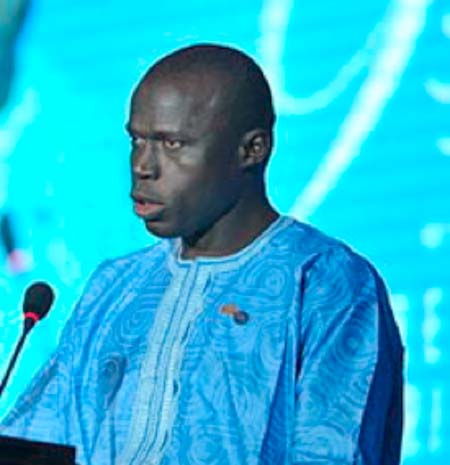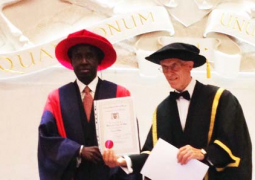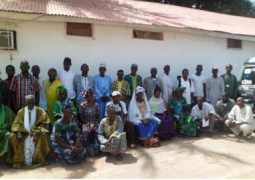
The country would continue to grapple with the growing level of public debt, especially the domestic component, which accounts for almost half of the country’s debt stock (standing at 107.6 per cent of GDP), the finance minister cautioned, while delivering the 2016 budget speech before deputies at the Assembly in Banjul.
He said to mitigate these challenges, as well as correct macroeconomic imbalances, “government remains committed” to bringing the level of domestic borrowing to near zero in the medium to long term in an effort to achieve macroeconomic stability.
Minister Kolley added: “Our economy has been hit in recent times by external shocks, through the Ebola virus and delayed or insufficient rains putting additional pressure in the growth potential of the agriculture and tourism sectors.”
In spite of these challenges, he stated, the economy remained resilient and it was able to register positive growth of 0.9 per cent in 2014 compared to an initial estimate of 4.7 per cent.
“Surmounting the challenges we face will require strict discipline in budget execution by all accounting officers and we call for the cooperation of all,” the Finance minister said.
“In addition to our national efforts, we also call on our development partners, bilateral and multilateral, who have accompanied us thus far, to continue the journey with us in a reinvigorated partnership to ensure that no one is left behind,” he said.
REVENUE AND EXPENDITURE
The Finance Minister further informed deputies that the total revenue and grants in 2016 is estimated at D12.99 billion from D11.20 billion in 2015, representing a growth of 16.0 per cent.
He added that domestic tax revenue is projected to grow by 7.4 per cent from D8.0 billion in 2015 to D8.6 billion in 2016.
“Non-tax revenue on the other hand, is estimated to decline to D0.7 billion in 2016 compared to D0.8 billion, this represents a decline of 16.5 per cent over the period,” he said, adding that in 2016, project grants are estimated at D4.4 billion compared to D3.2 billion in 2015, representing an increment of 37.8 per cent over the period.
On expenditure, the minister said the government’s total expenditure and net lending is projected at D16.8 billion in 2016 from D11.7 billion in 2015, representing an increase of 44.4 per cent, “the bulk of which is directed to recurrent spending”.
“Expenditure on personnel emoluments is projected to increase moderately from D2.0 billion in 2015 to D2.2 billion in 2016, indicating a growth of 10 per cent over the period,” he added.
Other recurrent expenditure is estimated to grow by 70 per cent, from D5.0 billion in 2015 to D8.1 billion in 2016, he further stated, adding that “the growth was primarily the result of arrears settlements, OMVG contribution and further investment in the education sector in the form of scholarships”.
Capital expenditure, he stated, is estimated to increase from D2.0 billion in 2015 to D2.8 billion in 2016, representing about 40 per cent growth.
“Overall, the fiscal deficit is anticipated to increase to D3.9 billion (9.3 per cent of GDP) in 2016,” the finance minister said, adding: “Due to increasing fiscal imbalances, government will continue its fiscal consolidation and improve resource mobilization.”
PUBLIC DEBT
According to the budget speech delivered by the minister, the country’s public debt for 2015 is estimated at 107.6 per cent of GDP, comprising 48.6 per cent domestic debt and 59 per cent external debt.
“In 2016, the public debt is projected to decline to 102.4 per cent of GDP primarily as a result of increased government efforts in curtailing the level of both domestic and external debt,” Minister Kolley said.
“Domestic and external debts are both projected to decline to 46.4 per cent and 56 per cent respectively in 2016.”
He said further: “While the Net Domestic Borrowing at about 8 per cent of GDP for 2016 is high, Government remains committed in making efforts to contain it to levels consistent with macroeconomic stability.
“In doing so,government will restrain the growinglevels of domestic debt that haveput excessive pressure on treasury bill yields over the recent years.
“The result of this effort will not only reduce pressures on Domestic T-bill yields, but also lower borrowing cost for both public and private sector in the medium to long term thereby creating space for private sector investment initiatives.”
REVENUE MEASURES FOR 2016
Veering into revenue measures, Minister Kolley said consistent with the policy of tax for development, with effect from 1 January 2016, Government will implement the following reform measures:
Corporate tax will be reduced from 31 per cent to its final target of 30 per cent as envisaged when the measure was introduced in 2010.
Taxation on tobacco products will be increased as follows: specific excise tax on cigarettes will be increased from D12 per pack to D15 per pack; environmental tax on cigarettes from D2.20 per pack to D2.42 per pack; excise tax on other tobacco products from D200 per kg to D300 per kg; and environmental tax on other tobacco products from D110 per kg to D120 per kg.




